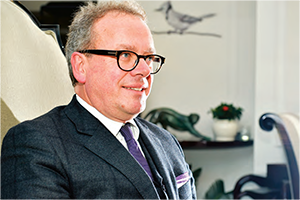
Tailoring is trust
Not eager to be in the media spotlight, but to earn the lifetime trust of its customers, Scabal is a luxury tailoring company “committed to quality, not to quantity,” as Matthias Rollmann, Director for Finished Products, describes it. The family-owned firm has been making some of the finest fabrics in the world since 1938. Also, some 40 years ago, it entered the high-end customer tailoring business, making suits worn by top politicians, famous music and cinema stars, but also by discrete professionals and businesspeople. Mr Rollmann talked to us about Scabal’s unique offer and the company’s exclusive partner in Romania, Julia Kristensen.
How would you describe Scabal to someone hearing for the first time about the company?
Scabal is a company that has two faces. One face is producing the world’s best fabrics which are sold worldwide to fashion companies such as Brioni, Hermès, Polo Ralph Lauren, Tom Ford and others. We also use these fabrics to tailor clothing. The beginning of Scabal business was 75 years ago, producing and selling fabric. The other face of the firm appeared in the 70s and 80s, when tailoring was already a dying art, so our owners, the Thissen family, took it as a chance to say: “Ok, we can develop our business more vertically. We control the wool and it would be a great idea to go one step further in refinement and make clothing from our own fabric.” At the beginning of the finished products of Scabal stood the idea of making individual clothing, not prêt-à-porter, not big collections, but to give people their own individual garment.
Without chain stores, you have customers in over 60 countries. Where do they learn of you?
What is most important for us is making for you, your own suit – with special lining, your monogram, special pockets, special waistcoat, shoulders pads or not, as many buttons you like… Scabal has taken over the duty and the talent of the tailor. Over the decades, we have been developing and grooming retailers, such as Julia Kristensen, the owner of Casa Frumoasă, Scabal’s partner in Romania. For us, it is very important to have a “local hero,” somebody like Julia who knows all the important people in Bucharest. And they trust her as a business person. Tailoring is trust. You go to a tailor and you ask to have something made for you, but the tailor will ask something from you as well. He will ask for some form of payment for a service that you will receive weeks after. You come to Julia, you are measured up, you make a down payment and in four weeks you get a suit. It is a big leap of faith, it’s a big trust in the person you go to. For us it is very important to identify the right people in Bucharest, in Moscow, in Kiev, in Hamburg, in Paris, in London, everywhere, who are capable and trustworthy enough to offer this service to their clients. We need people like Julia to attract a customer, to make a proposal. Then Julia and our team will give advice about colors, textures, styling and special fittings.
What makes Scabal’s offer to customers special?
Firstly, Scabal makes the best fabrics in the world and I can say this without being red in the face. Secondly, Scabal has the greatest variety. At all times, Scabal has between 4,000 and 5,000 articles, colours and designs in its collection. I do not know any other company that offers such a choice. Furthermore, when we tailor a garment, you have a choice between fitting ranges: classical or modern British look. The company is based in Belgium, but the heart of the company beats in Savile Row, in London, where we have our flagship store and also the heritage of making and trading fabric is in its origin British-inspired. When I say British, it’s not the bowler hat and the umbrella. It is more Aston Martin, James Bond, David Beckham… A modern, a “cool Brit” approach as far as the styling is concerned. The way we cut our suits is more British than Italian, so we differ from the offer of very good companies such as Zenia, Brioni, Canali and so on. We respect them very much, often they are customers of ours for the fabrics, but we have a different outlook. Our customer can expect a slightly different look in the top luxury level from us than from the Italian producers and he can expect not only the choice of fabrics, but a choice of a variety of tailoring and options. Things that you can do to your garment that are unparalleled, no other company has the kind of choice to make your own personal garment.
This places the company in the competitive high-end of the global menswear market…
Scabal is not very obvious luxury, but it’s refined luxury. And, at the same time, it’s affordable luxury. We pride ourselves on a defintion of luxury that is achievable by many people. We don’t want to do something that only a handful of people can buy. I always tell my customers that Scabal is like BMW or Audi. It’s very attractive, powerful, it’s a great statement of design, extremely reliable, it will never let you down. And you can still afford it. That’s why I don’t say Bentley or Ferarri, Maybach… We want customers to be able to afford it, so we sell to managers, to lawyers, doctors, owners of companies, politicians, actors. We have some very famous people amongst our customers.
Could you discolse some names of famous customers and your price range?
Only last week I was told that Eric Clapton bought a suit from us, Paul McCartney owns suits for us, Justin Timberlake, David Beckham, Donald Trump, politicians, many show people, singers. Our customers are not just old rich politicians. The great majority of our customers are normal people. You have to be not poor, you have to have some money. A normal Scabal suit would begin at 1,500 euros but there’s no limit. We’ve recently sold a coat from pure vicuña for more than 20,000 euros. You can buy extraordinary garments for us, but many people buy suits from 1,500 to 2,500 euros. That’s more or less the range in which we operate.
For many foreign businesses, Romania is not an appealing market. What attracts you here?
We came to Romania through one person, Julia Kristensen, we found each other. We helped make Julia Kristensen in Romania and she helped make Scabal in Romania. When Julia started her business it was made-to-measure, and she developed in a very professional way. By doing so, she helped Scabal establish a name in Romania and by giving her all the support we could, we helped establish Julia Kristensen as a name in the menswear in Romania. She started doing business with us in Romania 17 years ago. We were interested in Romania, because in those days it was a desert as far as fashion and good clothing was concerned. People were at the beginning, their wardrobes were empty and they were hungry for good taste, for European styling, for nice fabrics, for good fitting etc. It was a fantastic time in which to start a business and develop it together. Now Romania is more mature as a market, but still very interesting, because now people know a lot more, they have a good knowledge, all the top brands are in Romania. I am proud to say that we were among the first to come here. Many of the very important people in Romania have known Scabal since a long time. Because Julia Kristensen developed the business so well, we were able to stay with her exclusively as a partner. We didn’t want to make our own boutiques, and with Julia we’re in three places in Bucharest: at Casa Frumoasă, Marriott and Radisson.
Is the old saying “clothes makes the man” still availvable today?
It is very true, it’s more important than people think nowadays. You have only one chance for a first impression. That is my credo, that is what I tell everybody who comes to me for advice in clothing. If you miss this chance, it’s very hard to change it. As you come out of the door, it’s very important to appear how you want to be, to make a certain impression. I am a big believer in “dress for success.” I am surprised and sometimes shocked of how little men still care for this. There is a tendency to dress down, to be a little more sloppy, but I can tell you that people look at how you look like. And they see if your watch is very cheap, if your suit is not good, they notice if your shirt is clean or if your tie is nice or if your hair is cut properly. You can also overdo it, let’s say, if you’ve overdressing your superior. But the danger of that is very limited. Most people nowadays underdo it and I always say that they miss an opportunity. First of all, clothing is a sign of respect to people you like most. Respect for yourself and for the people you meet, you see during the course of the day. If you’re a terrible person, good clothing will not make you a good person, but it will make you appear a good person.
Does your view reflect the fact that you are rather counsellors than salespeople at Scabal?
We try to help people make the good impression that they want to make and we want to protect our customers from going too fashionable. For instance, there is a fashion for men of wearing their jackets very short. In some cases, when you’re very young, very sporty, very good-looking, it can be good. But if you’re like me, over 50, not entirely slim and you wear a jacket that is five or ten centimeters short, you look ridiculous. We try to protect people from doing the wrong thing. People in the past went to the tailor for advice, but this advice is missing today. You run into a shop and people there are so desperate to sell you something, so if you pick anything, they will sell you that. We want to give you the right advice. There are many tricks that you could employ to make the best of your physique. Of course, at the end of the day we want to sell you something, but also to tell you what not to buy. We take the liberty to say “This is not for you.” Our suits should be an investment that it’s worth it.
Since many skills of yore have disappeared, how hard is it to find a good tailor these days?
It’s hard to find good tailors, and that is why we have a factory in Germany and our workshop in Italy. We train a lot of tailors, we teach young people to do tailoring, because our experience is that it takes minimum as long to be a good tailor as it takes to be a good doctor. We’re talking about 5-6-7 years. It’s very difficult to get these craftspeople and all luxury companies have the same problem. Craftspeople are dying out, and all the young people want to be IT specialists, journalists, whatever, and they say: “Why should I saw trousers?” But a good craftsman is, in the end of the day, the real king. He can do things that nobody else can do. In an era of mass production when most of our clothing comes from China or Bangladesh it is very desirable to have a few pieces in your wardrobe that are genuine, of good quality, traditionally tailored.









